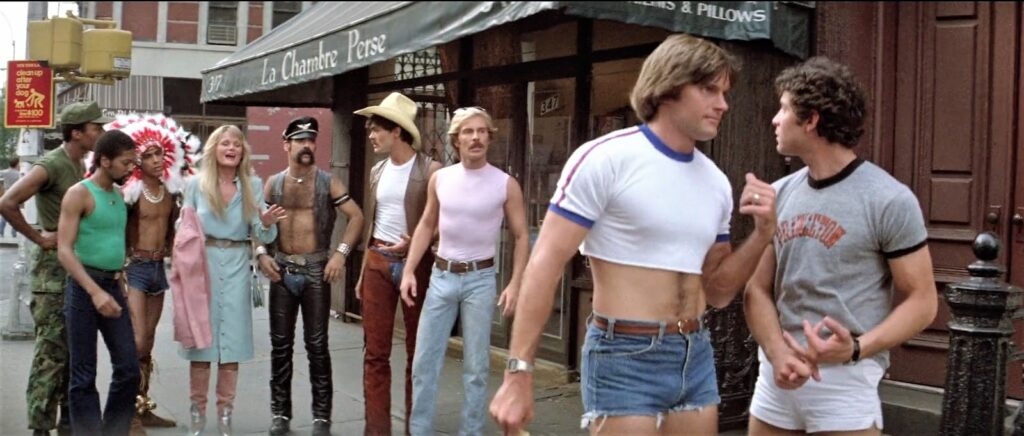by The Fluffer
Yes, that’s right. We’re speaking up for Can’t Stop the Music.
Yes, we know it flopped.
We get the comic value of a British company – EMI Films – financing such an American story, and of producer Alan Carr blowing all his post-Grease credit on this, and it coming out at the end of the disco boom.
And yes, it is funny that this made money in Japan and Australia and nowhere else.
Can’t Stop the Music is still worthy of serious re-appraisal.
We’re not kidding.
For starters, there is the gay thing – we may as well lunge straight in because you can’t discuss Can’t Stop the Music without it. Maybe we should say “queer” because there’s a petri dish of stuff going on in the film, especially with the cast including a pre-transition Caitlyn Jenner. And Can’t Stop the Music is a remarkably positive depiction of queer life, which is shown to be full of friendship, dancing, singing, fun and camaraderie.
Admittedly, no one is specifically labelled same-sex-attracted in the movie, but the “coding” is all over the place – particularly, the character played by Steve Guttenberg (based on Jacques Morel, driving force behind the Village People, who later died of AIDS) who is platonically living with Valerie Perrine, not to mention most of the Village People, particularly the Indian, the biker, the construction worker.
Most queer characters from the 1970s, whether coded or out, tended to be depicted negatively – sad (Boys in the Band, Sunday Bloody Sunday), killers (Diamonds are Forever, Vanishing Point) or grotesques (Rocky Horror Show) or a combination of all three (Cruising). Those in Can’t Stop the Music are just regular (ish) people having a good old time, which is in many ways revolutionary. (AIDS would see another decade of on-screen misery until good times rolled again in the 1990s).
Furthermore, the whole movie is a love letter to New York, which is depicted as a supportive village full of artists, character actors and low comedy. “Let’s make a band and put on a show.” It’s not a documentary but then neither was My Sister Eileen (an influence on the story, as was Gentlemen Prefer Blondes)
Then there’s the fact that Can’t Stop the Music was directed by a woman, Nancy Walker (a hugely experienced actor, who had directed some sitcoms), whose contribution was routinely dismissed by film bro critics (“she was old! No other features!”). Walker isn’t the greatest visual stylist and we’re aware that it was a tricky shoot, but her direction is perfectly competent and the whole movie is infused with a great deal of fun and adequate performances, especially considering so many of the cast were inexperienced.
The main issue with Can’t Stop the Music is its silly script, which has too many characters (particularly a weirdly large amount of older white women with no real impact on the plot), and lacks both a strong central relationship and basic narrative conflict. (Compare it with Grease, which had a solid core in the Danny/Sandy romance, and a strong subplot with Rizzo.). But hysterical critics from the time made a point of attacking Walker.
The battle against female directors in the 1980s – in which critics played a crucial role in knocking them down – has still not received its full and proper attention (maybe because the battle is still going on). The most attacked was Barbra Streisand for Yentl, but there was also the frenzy over Elaine May’s Ishtar, not to mention the departure of Mary Lambert from Under the Cherry Moon, Martha Coolidge from Some Kind of Wonderful, Joyce Chopra from Bright Lights Big City, Claudia Weill from Less Than Zero, and Jan Eliasberg from How I Got into College (all of whom were replaced by men) not to mention the panicked reaction to Michelle Manning directing Blue City. Manning, like Walker, was one of many female directors only given one shot at a feature. (Another one was Pat Birch who did Carr’s Grease 2.)
Can’t Stop the Music does try to give value for money to the viewer. There is lots of dancing, disco, camp, stars, plots, good cheer, silly jokes, production value, and brisk tunes. It’s silly, it lacked construction, its timing was bad, but it says as much about an era in our history as Taxi Driver.




